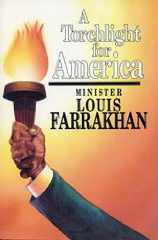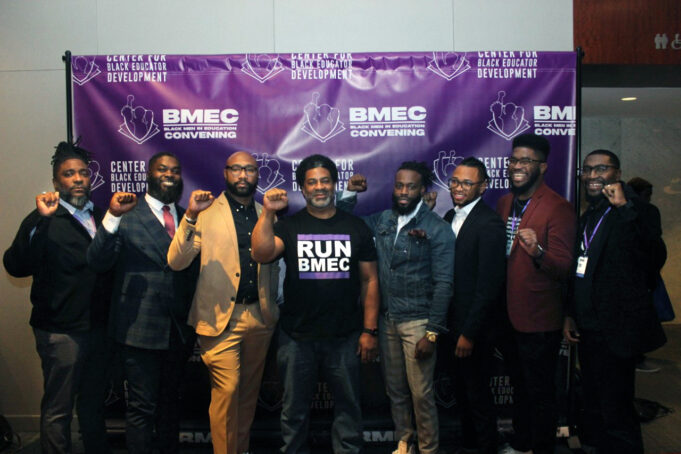“The acquiring of knowledge for our children and ourselves must not be limited to the three R’s—reading, ‘riting, and ‘rithmetic. It should instead include the history of the Black nation, the knowledge of civilization of man and the universe, and all sciences. It will make us a greater people of tomorrow.”
—The Honorable Elijah Muhammad, “Message To The Blackman in America”
PHILADELPHIA—Over 1,000 Black educators, principals, and administrators from around the country gathered in Philadelphia essentially affirming what the Honorable Elijah Muhammad, the Eternal Leader of the Nation of Islam, established starting in the 1930s. The understanding that Black students need Black teachers who understand the importance of culturally relevant education and the purpose of education.
The conference was designed to create a space for dialogue about the critical role that educators play in the lives of Black children. This year’s gathering also focused on the critical need for more Black male teachers.
“The conference represented a clarion call that Black students need Black teachers,” Dr. Sharif El-Mekki told The Final Call. The conference, entitled “Teaching is Revolutionary,” was hosted by The Center for Black Educator Development and its affiliate, Black Men Educators Convening (BMEC), headed by Dr. El-Mekki, a master educator. The gathering was held at the downtown Lowes Hotel from November 17-19.

“I’ll share the rallying cry, and the demand of our Black youth is that we need Black teachers. That’s what our youth have said. This was their phrase that they coined. And they’ve asked all of us to communicate the message but also charged us with helping them build a Black teacher pipeline,” said Dr. El-Mekki.
The conference also sought to address the unique experiences, needs, and challenges of Black male educators. Attendees included a mix of veteran and novice teachers and students, administrators, and educators from across the country.
Presenters and participants discussed how to best support Black students in the classroom and beyond. There was a strong consensus among participants that educators must be more than just teachers—they must also be mentors and role models. To truly meet the needs of Black students, educators must be able to relate to their students on a personal level and understand their unique experiences to provide the guidance and support Black students need to succeed in school and life, organizers explained.
The need for more Black teachers
Panelists presented vital information in a session titled “The Leadership Necessary for a Sustained, Highly Effective Black Teacher Pipeline.” It featured Dr. Kwame Simmons, Principal Baruti Kafele, Dr. Salome Thomas-El, and Roberto Rodriguez. They noted that Black youth must see themselves reflected in the educators entrusted with their care and education. Too often, America’s schools, particularly its public schools, are staffed with teachers who lack an understanding of or respect for the cultures of their students.

The panel discussion included the sharing of research that documents that when students see themselves represented in their teachers, they are more likely to feel valued and respected, leading to better academic and social outcomes.
“There is a crisis that I call the academic pandemic. The Covid pandemic exacerbated an education crisis that existed before the epidemic. For Pennsylvania in general, 10 years ago, we graduated 20,000 people preparing for careers in education across the state. Ten years later, the number is 6,000. We do not have enough people in the field. We clearly don’t have enough Black and Brown teachers or professionals. Black teachers must unite to share best practices and policies and sustain and lift one another,” State Senator Vincent Hughes, a participant in the opening panel discussion, told The Final Call.
The conference included panel discussions, workshops, and breakout sessions on topics such as effective leadership strategies to sustain a Black teacher pipeline and culturally relevant teaching practices. In addition, there were keynote speeches from some of the most influential voices in education, including Dr. Chris Emdin and special guest Ilyasah Shabazz, daughter of Malcolm X and Dr. Betty Shabazz. The conference provided attendees with an important space to share best practices, build relationships and learn from one another.
“I think the other message about this conference is the intergenerational nature of teaching and learning and that it has to be intergenerational and we have to invite each other into this profession, support each other, hold each other accountable, but then also invite our youth to help solve a problem that they had no hand in creating which is the lack of Black teachers and the impact of Black teachers,” said Dr. El-Mekki.
In the U.S., only seven percent of teachers are Black, and only two percent are Black men.

“Black students are not being served well by American schools. Black students—and Black males in particular—confront obstacles in schooling that create opportunity gaps that too often lead to lower educational attainment,” wrote researcher Constance A. Lindsay in the Fall 2020 issue of Edge: Carolina Education Review. Ms. Linsday is an assistant professor in educational leadership at the UNC School of Education. Non-White students make up over 50 percent of students in the U.S.
According to conference host Donna Davidson, the gathering in Philadelphia was an opportunity for Black educators to come together and reaffirm their commitment to supporting Black male teachers. By doing so, they hope to increase the number of Black men entering the teaching profession and create more opportunities for them to succeed. In recent years there has been a decline in the number of Black men entering the teaching profession. While many factors contribute to this decline, one of the most significant is the lack of support for Black male teachers.

“The impact of Black men educators is so profound. It is the most underestimated, disinvested pipeline we see right now. And we have to change that, and we will be a part of that change,” said Horace Ryans III, Morehouse College student and participant in the Fellowship Pipeline program through the Center for Black Educator Development. He talked to The Final Call about the importance of the program. “Essentially, it aims to inspire Black youth in high school. We start with that and funnel them into a progressive line of support, love, and extreme care from these Black educators. The center was introduced to me in my junior year of high school,” he explained.
“Thus, high school students become college students. Students who major in education can then become teachers. The college students who enter the teaching pipeline are pushed further into this network of supportive, loving educators. Then it’s just a matter of going from there. My experience has been that I started as a junior in high school, and I’m now a junior in college, and I’ve stuck with it,” said Mr. Ryans.
Knowledge with a purpose
The Honorable Elijah Muhammad’s teachings on self-knowledge, self-determination and liberating education resounded throughout the conference. Speaker after speaker spoke on the power of proper education as a tool for liberation rather than oppression. The themes presented during the conference were congruent with the message of the Honorable Elijah Muhammad: we must educate ourselves to achieve true freedom.

“If Black students were taught about Ethiopia and Mali like they’ve been taught Greece and Rome many more would see their own power,” noted Ilyasah Shabazz during her remarks.
Dr. Greg Carr, associate professor of Africana Studies and Chair of the Department of Afro-American Studies at Howard University was very clear on the mission Black teachers should take. “The challenge we have is to embrace the fact that we are in a war. Some people will be offended, and I embrace that with both arms. Brother, let’s fight! I think we’ve lost that sense that we have a real and open enemy because we can’t forget that while we are here, the majority of our children—the vast majority—are being assaulted daily. Even while we’re here at this conference,” he told The Final Call.
“They are in school rooms around this country with teachers, many of whom do not love them, and some openly have contempt for them. And they are locked in states where the government is against them. Unless we accept that we are simply not going to be able to please everyone, we are not going to be able to do what’s necessary,” he said.
The Honorable Elijah Muhammad established an independent educational system and institution, Muhammad University of Islam, in the 1930s and the Muslims during that time took their children out of public schools so they could be properly educated. “One of the attributes of Allah, The All-Wise God, Who is the Supreme Being, is knowledge. Knowledge is the result of learning and is a force or energy that makes its bearer accomplish or overcome obstacles, barriers, and resistance.

In fact, God means possessor of power and force. The education my people need is that knowledge, the attribute of God, which creates power to accomplish and make progress in the good things or the righteous things,” the Honorable Elijah Muhammad wrote in His monumental book, “Message To The Blackman in America.”
His top student and National Representative, the Honorable Minister Louis Farrakhan explains in his book, “A Torchlight for America,” that true education cultivates the person—mind, body, and spirit—by bringing us closer to fulfilling our purpose for being, which is to reflect Allah (God). True and proper education also starts with the knowledge of God as God is the Author of Knowledge, he notes.
“A while ago, I coined the phrase, ‘he who gives the diameter of your knowledge prescribes the circumference of your activity.’ If you gain a limited knowledge, then you restrict the possibilities of what you can and will achieve. The capacity of man’s brain is infinite. Therefore, the greater one’s knowledge grows, the greater becomes one’s sphere of activity until it encompasses and reflects mastery of self and mastery of the universe,” the Minister wrote.
“A new public school system should relate the curriculum to the self. When we see the curriculum as an outgrowth of self, then we can identify with the curriculum, giving us an incentive to learn. In the Muhammad University of Islam school system, our students’ learning is facilitated because they identify with the subjects. They are taught that they are the subject.
They are taught, ‘I am chemistry.’ Not, ‘I am a student of chemistry,’ rather, ‘I am biology. I am economics. I am history. I am mathematics.’ When we relate the forces within self to the forces that lie outside the self, this connects us to subjects we are studying in a manner that we can ultimately master these subjects,” Minister Farrakhan writes.
Dr. Chris Emdin issued a call to action to participants at the conclusion of the Philadelphia conference. “Get off your knees and don’t be spellbound by the master’s gifts,” he said. He also stated that education should incorporate the spirit of God pointing out. “Church and state are not separated. Collective humanity must be taught. For our people, the Lord still speaks.”













